MBA632: Knowledge Management - Privacy and Confidentiality Report
VerifiedAdded on 2022/08/25
|11
|2814
|18
Report
AI Summary
This report delves into the critical aspects of knowledge management (KM), particularly focusing on privacy and confidentiality within organizational contexts. It begins by highlighting the importance of KM in enhancing organizational efficiency and competitiveness through effective resource and information handling. The report then examines current initiatives and developments in KM, emphasizing the role of intranets and technological tools in facilitating knowledge sharing and accumulation. However, it underscores the challenges and barriers to KM, especially those related to ensuring data security and protecting sensitive information. The report also discusses the ethical implications of privacy and confidentiality issues in KM practices, including the potential for data breaches, unauthorized access, and the need for robust security strategies. It analyzes various security concerns associated with KMS, such as the security of databases, file servers, and email servers. The report concludes by offering solutions to mitigate privacy and confidentiality issues, including the implementation of strict security policies, data encryption, user authentication, and the use of secure portals. Ultimately, the report stresses the need for a comprehensive approach to KM that prioritizes data security and ethical practices to maximize the benefits of KM initiatives.
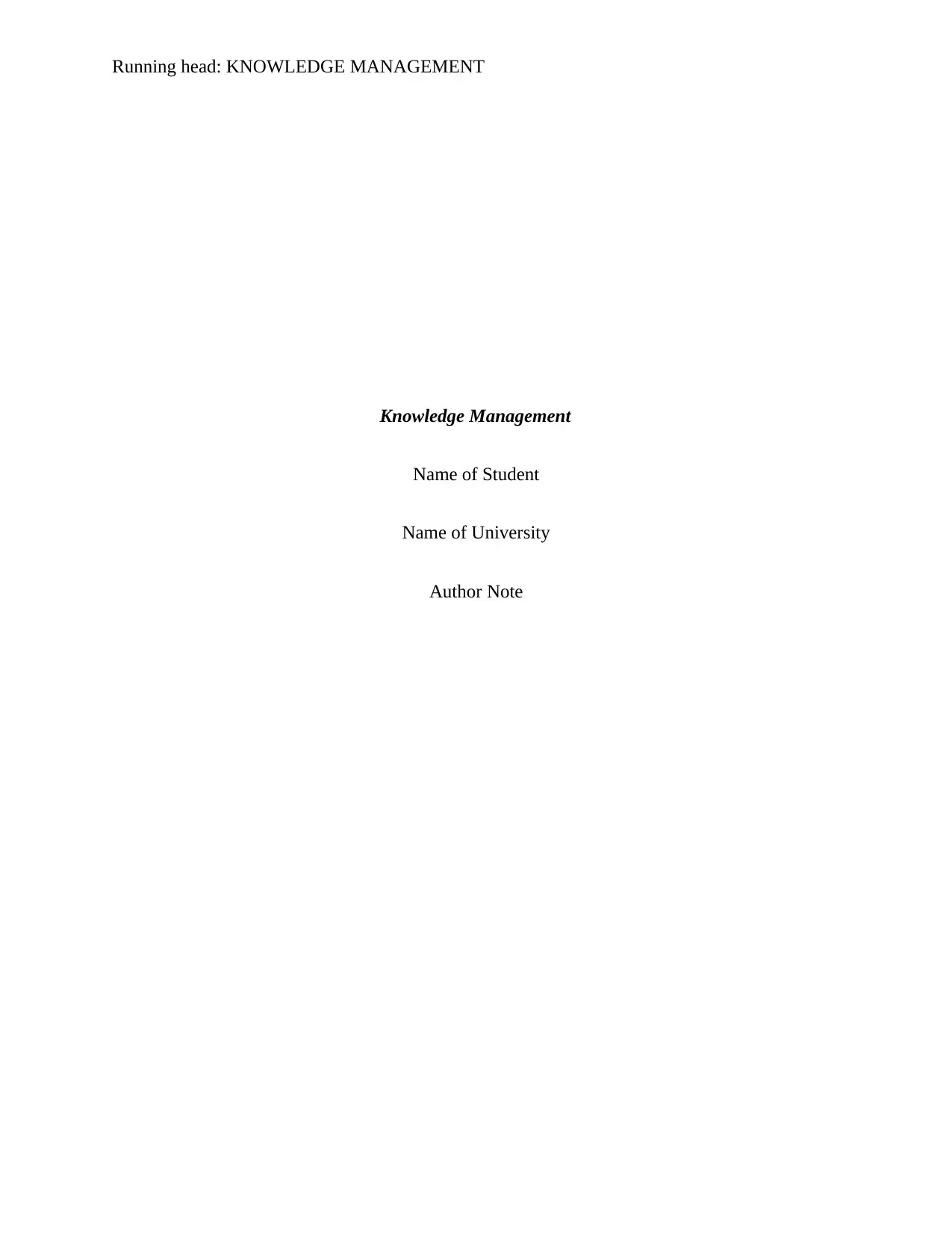
Running head: KNOWLEDGE MANAGEMENT
Knowledge Management
Name of Student
Name of University
Author Note
Knowledge Management
Name of Student
Name of University
Author Note
Paraphrase This Document
Need a fresh take? Get an instant paraphrase of this document with our AI Paraphraser
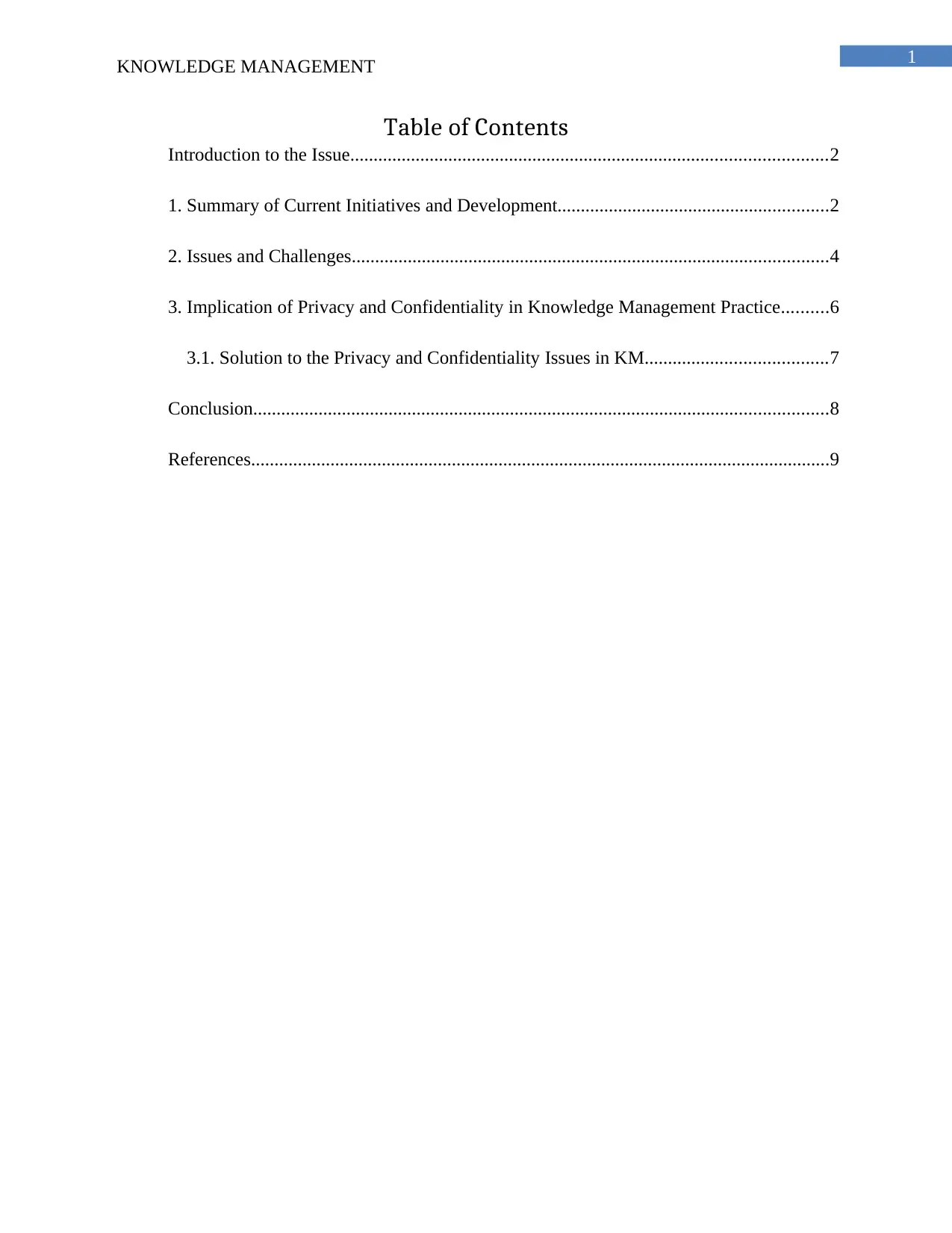
1
KNOWLEDGE MANAGEMENT
Table of Contents
Introduction to the Issue......................................................................................................2
1. Summary of Current Initiatives and Development..........................................................2
2. Issues and Challenges......................................................................................................4
3. Implication of Privacy and Confidentiality in Knowledge Management Practice..........6
3.1. Solution to the Privacy and Confidentiality Issues in KM.......................................7
Conclusion...........................................................................................................................8
References............................................................................................................................9
KNOWLEDGE MANAGEMENT
Table of Contents
Introduction to the Issue......................................................................................................2
1. Summary of Current Initiatives and Development..........................................................2
2. Issues and Challenges......................................................................................................4
3. Implication of Privacy and Confidentiality in Knowledge Management Practice..........6
3.1. Solution to the Privacy and Confidentiality Issues in KM.......................................7
Conclusion...........................................................................................................................8
References............................................................................................................................9
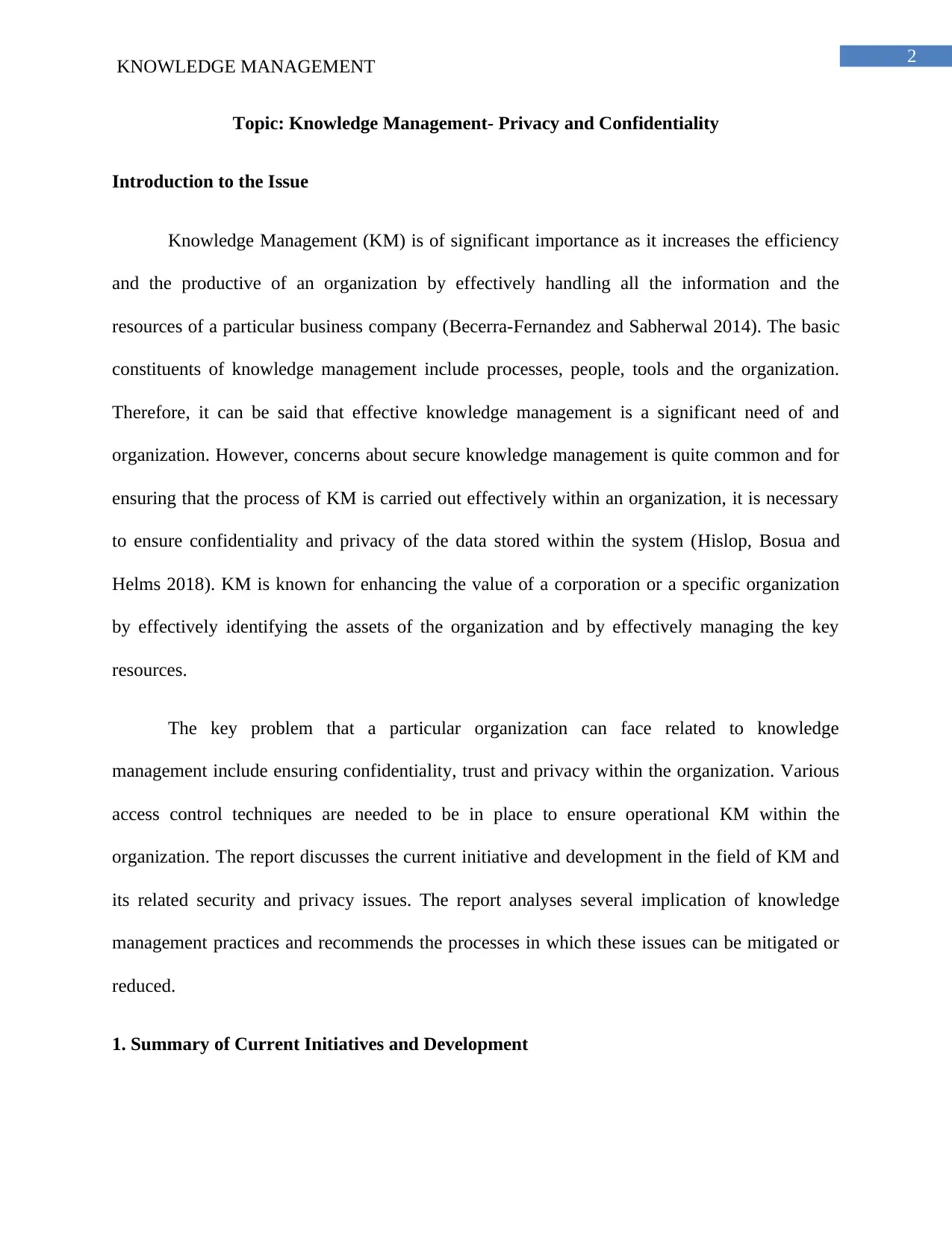
2
KNOWLEDGE MANAGEMENT
Topic: Knowledge Management- Privacy and Confidentiality
Introduction to the Issue
Knowledge Management (KM) is of significant importance as it increases the efficiency
and the productive of an organization by effectively handling all the information and the
resources of a particular business company (Becerra-Fernandez and Sabherwal 2014). The basic
constituents of knowledge management include processes, people, tools and the organization.
Therefore, it can be said that effective knowledge management is a significant need of and
organization. However, concerns about secure knowledge management is quite common and for
ensuring that the process of KM is carried out effectively within an organization, it is necessary
to ensure confidentiality and privacy of the data stored within the system (Hislop, Bosua and
Helms 2018). KM is known for enhancing the value of a corporation or a specific organization
by effectively identifying the assets of the organization and by effectively managing the key
resources.
The key problem that a particular organization can face related to knowledge
management include ensuring confidentiality, trust and privacy within the organization. Various
access control techniques are needed to be in place to ensure operational KM within the
organization. The report discusses the current initiative and development in the field of KM and
its related security and privacy issues. The report analyses several implication of knowledge
management practices and recommends the processes in which these issues can be mitigated or
reduced.
1. Summary of Current Initiatives and Development
KNOWLEDGE MANAGEMENT
Topic: Knowledge Management- Privacy and Confidentiality
Introduction to the Issue
Knowledge Management (KM) is of significant importance as it increases the efficiency
and the productive of an organization by effectively handling all the information and the
resources of a particular business company (Becerra-Fernandez and Sabherwal 2014). The basic
constituents of knowledge management include processes, people, tools and the organization.
Therefore, it can be said that effective knowledge management is a significant need of and
organization. However, concerns about secure knowledge management is quite common and for
ensuring that the process of KM is carried out effectively within an organization, it is necessary
to ensure confidentiality and privacy of the data stored within the system (Hislop, Bosua and
Helms 2018). KM is known for enhancing the value of a corporation or a specific organization
by effectively identifying the assets of the organization and by effectively managing the key
resources.
The key problem that a particular organization can face related to knowledge
management include ensuring confidentiality, trust and privacy within the organization. Various
access control techniques are needed to be in place to ensure operational KM within the
organization. The report discusses the current initiative and development in the field of KM and
its related security and privacy issues. The report analyses several implication of knowledge
management practices and recommends the processes in which these issues can be mitigated or
reduced.
1. Summary of Current Initiatives and Development
⊘ This is a preview!⊘
Do you want full access?
Subscribe today to unlock all pages.

Trusted by 1+ million students worldwide
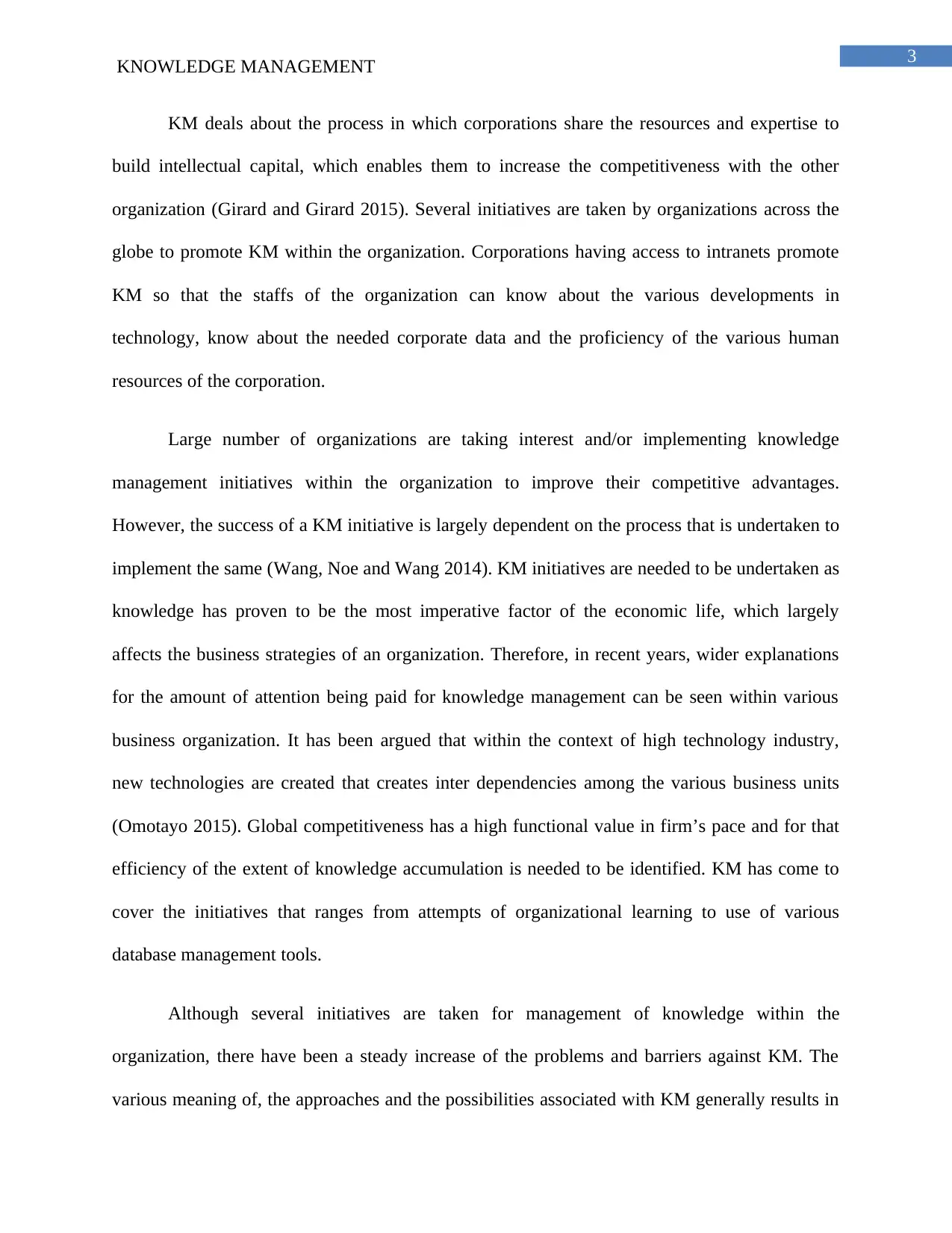
3
KNOWLEDGE MANAGEMENT
KM deals about the process in which corporations share the resources and expertise to
build intellectual capital, which enables them to increase the competitiveness with the other
organization (Girard and Girard 2015). Several initiatives are taken by organizations across the
globe to promote KM within the organization. Corporations having access to intranets promote
KM so that the staffs of the organization can know about the various developments in
technology, know about the needed corporate data and the proficiency of the various human
resources of the corporation.
Large number of organizations are taking interest and/or implementing knowledge
management initiatives within the organization to improve their competitive advantages.
However, the success of a KM initiative is largely dependent on the process that is undertaken to
implement the same (Wang, Noe and Wang 2014). KM initiatives are needed to be undertaken as
knowledge has proven to be the most imperative factor of the economic life, which largely
affects the business strategies of an organization. Therefore, in recent years, wider explanations
for the amount of attention being paid for knowledge management can be seen within various
business organization. It has been argued that within the context of high technology industry,
new technologies are created that creates inter dependencies among the various business units
(Omotayo 2015). Global competitiveness has a high functional value in firm’s pace and for that
efficiency of the extent of knowledge accumulation is needed to be identified. KM has come to
cover the initiatives that ranges from attempts of organizational learning to use of various
database management tools.
Although several initiatives are taken for management of knowledge within the
organization, there have been a steady increase of the problems and barriers against KM. The
various meaning of, the approaches and the possibilities associated with KM generally results in
KNOWLEDGE MANAGEMENT
KM deals about the process in which corporations share the resources and expertise to
build intellectual capital, which enables them to increase the competitiveness with the other
organization (Girard and Girard 2015). Several initiatives are taken by organizations across the
globe to promote KM within the organization. Corporations having access to intranets promote
KM so that the staffs of the organization can know about the various developments in
technology, know about the needed corporate data and the proficiency of the various human
resources of the corporation.
Large number of organizations are taking interest and/or implementing knowledge
management initiatives within the organization to improve their competitive advantages.
However, the success of a KM initiative is largely dependent on the process that is undertaken to
implement the same (Wang, Noe and Wang 2014). KM initiatives are needed to be undertaken as
knowledge has proven to be the most imperative factor of the economic life, which largely
affects the business strategies of an organization. Therefore, in recent years, wider explanations
for the amount of attention being paid for knowledge management can be seen within various
business organization. It has been argued that within the context of high technology industry,
new technologies are created that creates inter dependencies among the various business units
(Omotayo 2015). Global competitiveness has a high functional value in firm’s pace and for that
efficiency of the extent of knowledge accumulation is needed to be identified. KM has come to
cover the initiatives that ranges from attempts of organizational learning to use of various
database management tools.
Although several initiatives are taken for management of knowledge within the
organization, there have been a steady increase of the problems and barriers against KM. The
various meaning of, the approaches and the possibilities associated with KM generally results in
Paraphrase This Document
Need a fresh take? Get an instant paraphrase of this document with our AI Paraphraser
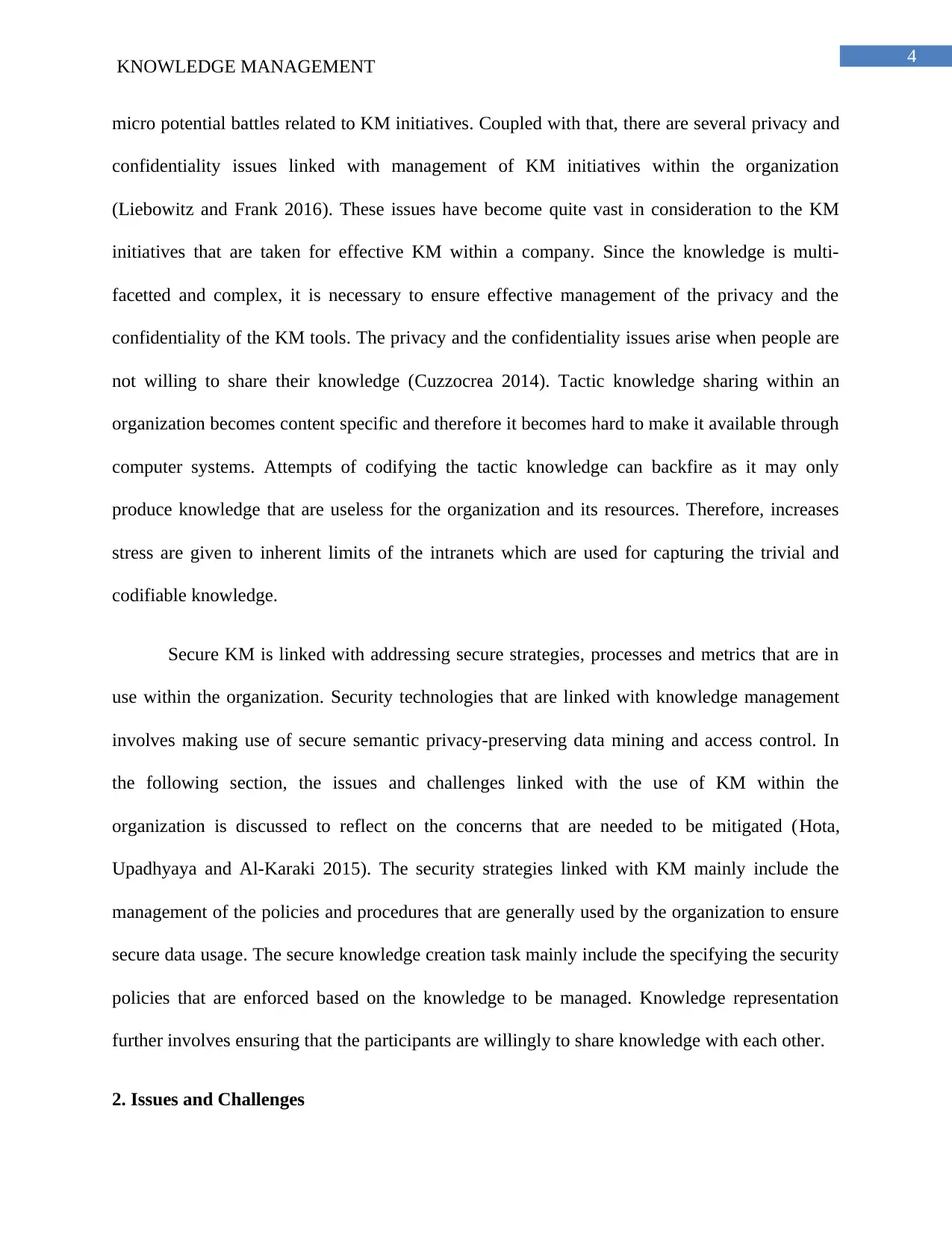
4
KNOWLEDGE MANAGEMENT
micro potential battles related to KM initiatives. Coupled with that, there are several privacy and
confidentiality issues linked with management of KM initiatives within the organization
(Liebowitz and Frank 2016). These issues have become quite vast in consideration to the KM
initiatives that are taken for effective KM within a company. Since the knowledge is multi-
facetted and complex, it is necessary to ensure effective management of the privacy and the
confidentiality of the KM tools. The privacy and the confidentiality issues arise when people are
not willing to share their knowledge (Cuzzocrea 2014). Tactic knowledge sharing within an
organization becomes content specific and therefore it becomes hard to make it available through
computer systems. Attempts of codifying the tactic knowledge can backfire as it may only
produce knowledge that are useless for the organization and its resources. Therefore, increases
stress are given to inherent limits of the intranets which are used for capturing the trivial and
codifiable knowledge.
Secure KM is linked with addressing secure strategies, processes and metrics that are in
use within the organization. Security technologies that are linked with knowledge management
involves making use of secure semantic privacy-preserving data mining and access control. In
the following section, the issues and challenges linked with the use of KM within the
organization is discussed to reflect on the concerns that are needed to be mitigated (Hota,
Upadhyaya and Al-Karaki 2015). The security strategies linked with KM mainly include the
management of the policies and procedures that are generally used by the organization to ensure
secure data usage. The secure knowledge creation task mainly include the specifying the security
policies that are enforced based on the knowledge to be managed. Knowledge representation
further involves ensuring that the participants are willingly to share knowledge with each other.
2. Issues and Challenges
KNOWLEDGE MANAGEMENT
micro potential battles related to KM initiatives. Coupled with that, there are several privacy and
confidentiality issues linked with management of KM initiatives within the organization
(Liebowitz and Frank 2016). These issues have become quite vast in consideration to the KM
initiatives that are taken for effective KM within a company. Since the knowledge is multi-
facetted and complex, it is necessary to ensure effective management of the privacy and the
confidentiality of the KM tools. The privacy and the confidentiality issues arise when people are
not willing to share their knowledge (Cuzzocrea 2014). Tactic knowledge sharing within an
organization becomes content specific and therefore it becomes hard to make it available through
computer systems. Attempts of codifying the tactic knowledge can backfire as it may only
produce knowledge that are useless for the organization and its resources. Therefore, increases
stress are given to inherent limits of the intranets which are used for capturing the trivial and
codifiable knowledge.
Secure KM is linked with addressing secure strategies, processes and metrics that are in
use within the organization. Security technologies that are linked with knowledge management
involves making use of secure semantic privacy-preserving data mining and access control. In
the following section, the issues and challenges linked with the use of KM within the
organization is discussed to reflect on the concerns that are needed to be mitigated (Hota,
Upadhyaya and Al-Karaki 2015). The security strategies linked with KM mainly include the
management of the policies and procedures that are generally used by the organization to ensure
secure data usage. The secure knowledge creation task mainly include the specifying the security
policies that are enforced based on the knowledge to be managed. Knowledge representation
further involves ensuring that the participants are willingly to share knowledge with each other.
2. Issues and Challenges
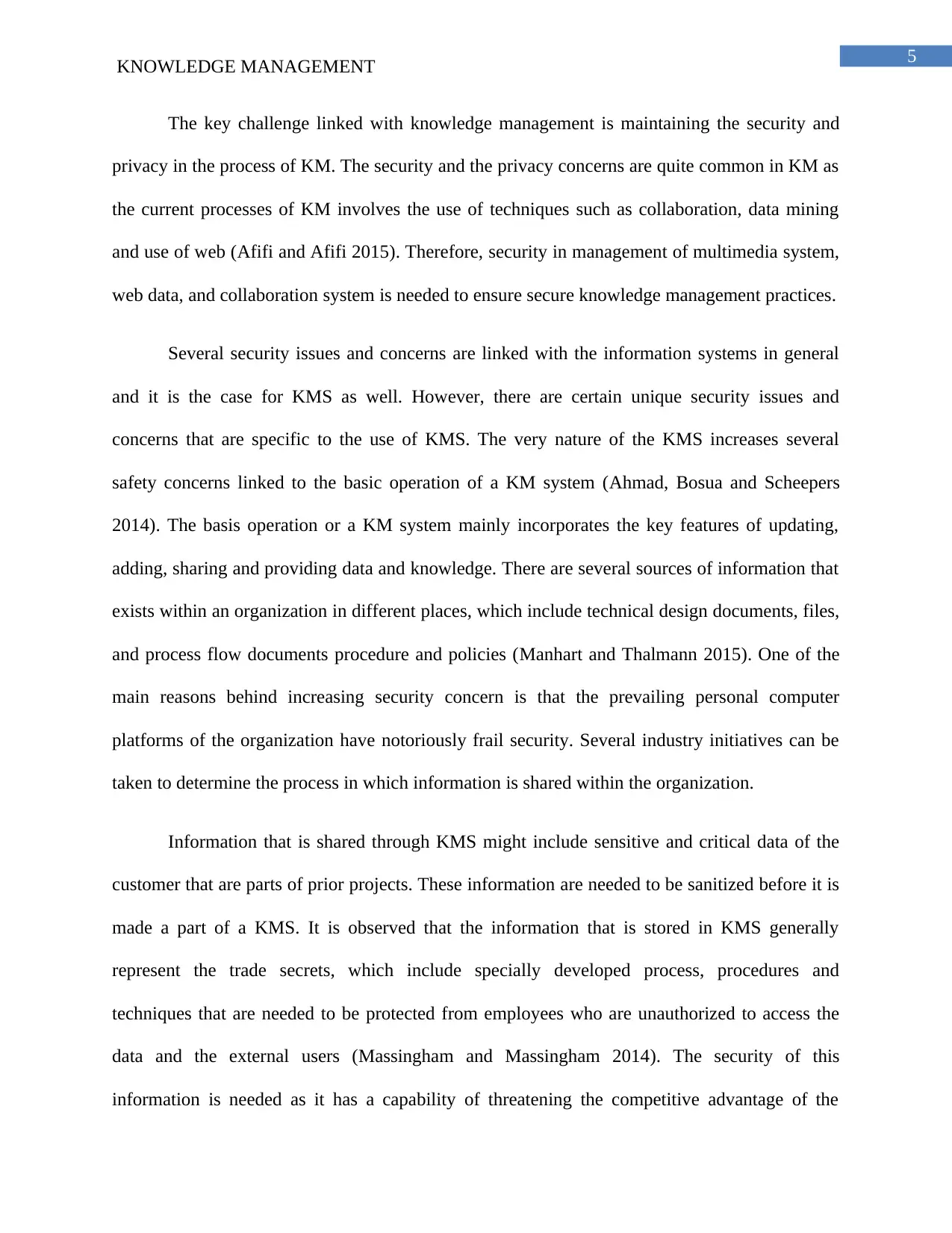
5
KNOWLEDGE MANAGEMENT
The key challenge linked with knowledge management is maintaining the security and
privacy in the process of KM. The security and the privacy concerns are quite common in KM as
the current processes of KM involves the use of techniques such as collaboration, data mining
and use of web (Afifi and Afifi 2015). Therefore, security in management of multimedia system,
web data, and collaboration system is needed to ensure secure knowledge management practices.
Several security issues and concerns are linked with the information systems in general
and it is the case for KMS as well. However, there are certain unique security issues and
concerns that are specific to the use of KMS. The very nature of the KMS increases several
safety concerns linked to the basic operation of a KM system (Ahmad, Bosua and Scheepers
2014). The basis operation or a KM system mainly incorporates the key features of updating,
adding, sharing and providing data and knowledge. There are several sources of information that
exists within an organization in different places, which include technical design documents, files,
and process flow documents procedure and policies (Manhart and Thalmann 2015). One of the
main reasons behind increasing security concern is that the prevailing personal computer
platforms of the organization have notoriously frail security. Several industry initiatives can be
taken to determine the process in which information is shared within the organization.
Information that is shared through KMS might include sensitive and critical data of the
customer that are parts of prior projects. These information are needed to be sanitized before it is
made a part of a KMS. It is observed that the information that is stored in KMS generally
represent the trade secrets, which include specially developed process, procedures and
techniques that are needed to be protected from employees who are unauthorized to access the
data and the external users (Massingham and Massingham 2014). The security of this
information is needed as it has a capability of threatening the competitive advantage of the
KNOWLEDGE MANAGEMENT
The key challenge linked with knowledge management is maintaining the security and
privacy in the process of KM. The security and the privacy concerns are quite common in KM as
the current processes of KM involves the use of techniques such as collaboration, data mining
and use of web (Afifi and Afifi 2015). Therefore, security in management of multimedia system,
web data, and collaboration system is needed to ensure secure knowledge management practices.
Several security issues and concerns are linked with the information systems in general
and it is the case for KMS as well. However, there are certain unique security issues and
concerns that are specific to the use of KMS. The very nature of the KMS increases several
safety concerns linked to the basic operation of a KM system (Ahmad, Bosua and Scheepers
2014). The basis operation or a KM system mainly incorporates the key features of updating,
adding, sharing and providing data and knowledge. There are several sources of information that
exists within an organization in different places, which include technical design documents, files,
and process flow documents procedure and policies (Manhart and Thalmann 2015). One of the
main reasons behind increasing security concern is that the prevailing personal computer
platforms of the organization have notoriously frail security. Several industry initiatives can be
taken to determine the process in which information is shared within the organization.
Information that is shared through KMS might include sensitive and critical data of the
customer that are parts of prior projects. These information are needed to be sanitized before it is
made a part of a KMS. It is observed that the information that is stored in KMS generally
represent the trade secrets, which include specially developed process, procedures and
techniques that are needed to be protected from employees who are unauthorized to access the
data and the external users (Massingham and Massingham 2014). The security of this
information is needed as it has a capability of threatening the competitive advantage of the
⊘ This is a preview!⊘
Do you want full access?
Subscribe today to unlock all pages.

Trusted by 1+ million students worldwide
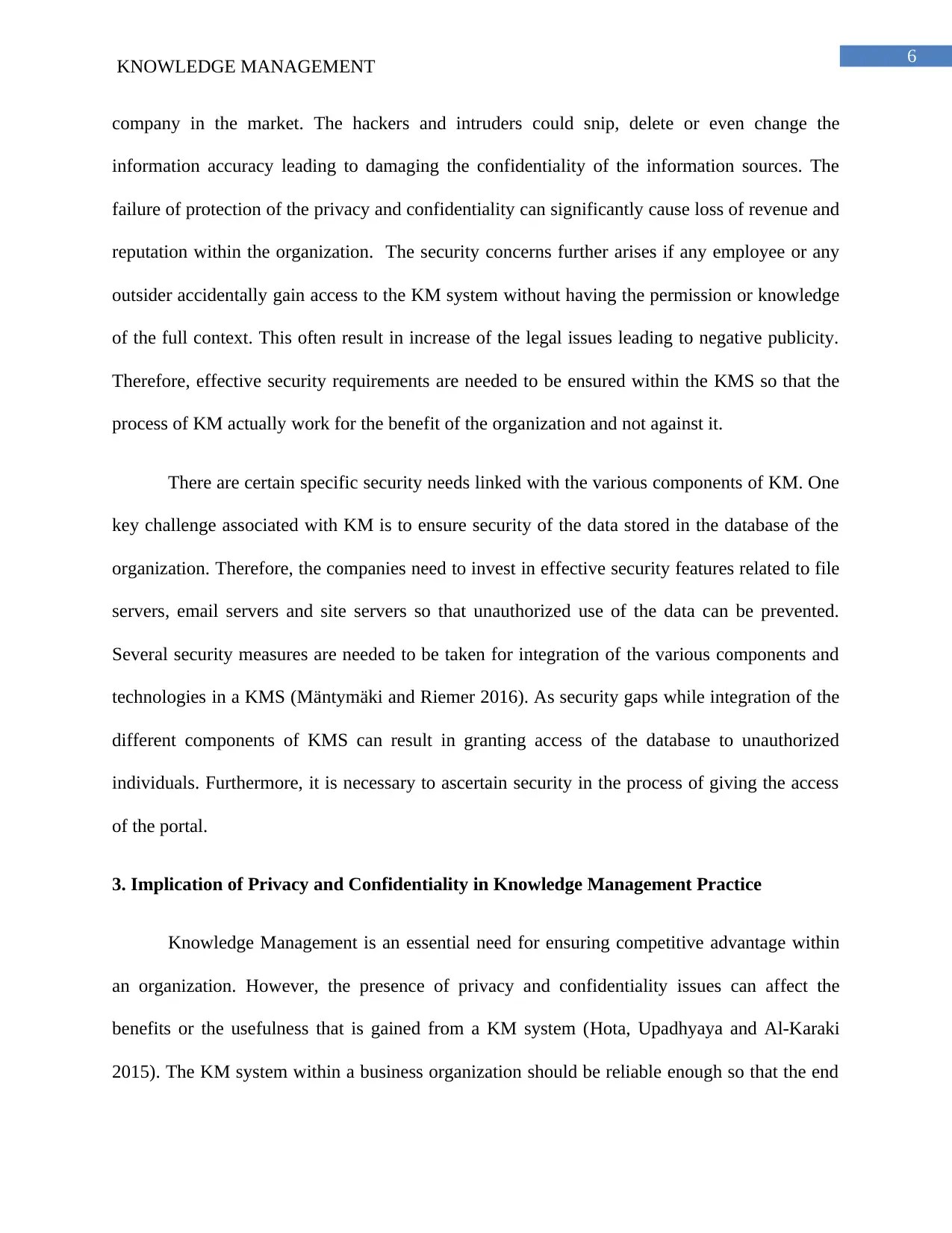
6
KNOWLEDGE MANAGEMENT
company in the market. The hackers and intruders could snip, delete or even change the
information accuracy leading to damaging the confidentiality of the information sources. The
failure of protection of the privacy and confidentiality can significantly cause loss of revenue and
reputation within the organization. The security concerns further arises if any employee or any
outsider accidentally gain access to the KM system without having the permission or knowledge
of the full context. This often result in increase of the legal issues leading to negative publicity.
Therefore, effective security requirements are needed to be ensured within the KMS so that the
process of KM actually work for the benefit of the organization and not against it.
There are certain specific security needs linked with the various components of KM. One
key challenge associated with KM is to ensure security of the data stored in the database of the
organization. Therefore, the companies need to invest in effective security features related to file
servers, email servers and site servers so that unauthorized use of the data can be prevented.
Several security measures are needed to be taken for integration of the various components and
technologies in a KMS (Mäntymäki and Riemer 2016). As security gaps while integration of the
different components of KMS can result in granting access of the database to unauthorized
individuals. Furthermore, it is necessary to ascertain security in the process of giving the access
of the portal.
3. Implication of Privacy and Confidentiality in Knowledge Management Practice
Knowledge Management is an essential need for ensuring competitive advantage within
an organization. However, the presence of privacy and confidentiality issues can affect the
benefits or the usefulness that is gained from a KM system (Hota, Upadhyaya and Al-Karaki
2015). The KM system within a business organization should be reliable enough so that the end
KNOWLEDGE MANAGEMENT
company in the market. The hackers and intruders could snip, delete or even change the
information accuracy leading to damaging the confidentiality of the information sources. The
failure of protection of the privacy and confidentiality can significantly cause loss of revenue and
reputation within the organization. The security concerns further arises if any employee or any
outsider accidentally gain access to the KM system without having the permission or knowledge
of the full context. This often result in increase of the legal issues leading to negative publicity.
Therefore, effective security requirements are needed to be ensured within the KMS so that the
process of KM actually work for the benefit of the organization and not against it.
There are certain specific security needs linked with the various components of KM. One
key challenge associated with KM is to ensure security of the data stored in the database of the
organization. Therefore, the companies need to invest in effective security features related to file
servers, email servers and site servers so that unauthorized use of the data can be prevented.
Several security measures are needed to be taken for integration of the various components and
technologies in a KMS (Mäntymäki and Riemer 2016). As security gaps while integration of the
different components of KMS can result in granting access of the database to unauthorized
individuals. Furthermore, it is necessary to ascertain security in the process of giving the access
of the portal.
3. Implication of Privacy and Confidentiality in Knowledge Management Practice
Knowledge Management is an essential need for ensuring competitive advantage within
an organization. However, the presence of privacy and confidentiality issues can affect the
benefits or the usefulness that is gained from a KM system (Hota, Upadhyaya and Al-Karaki
2015). The KM system within a business organization should be reliable enough so that the end
Paraphrase This Document
Need a fresh take? Get an instant paraphrase of this document with our AI Paraphraser
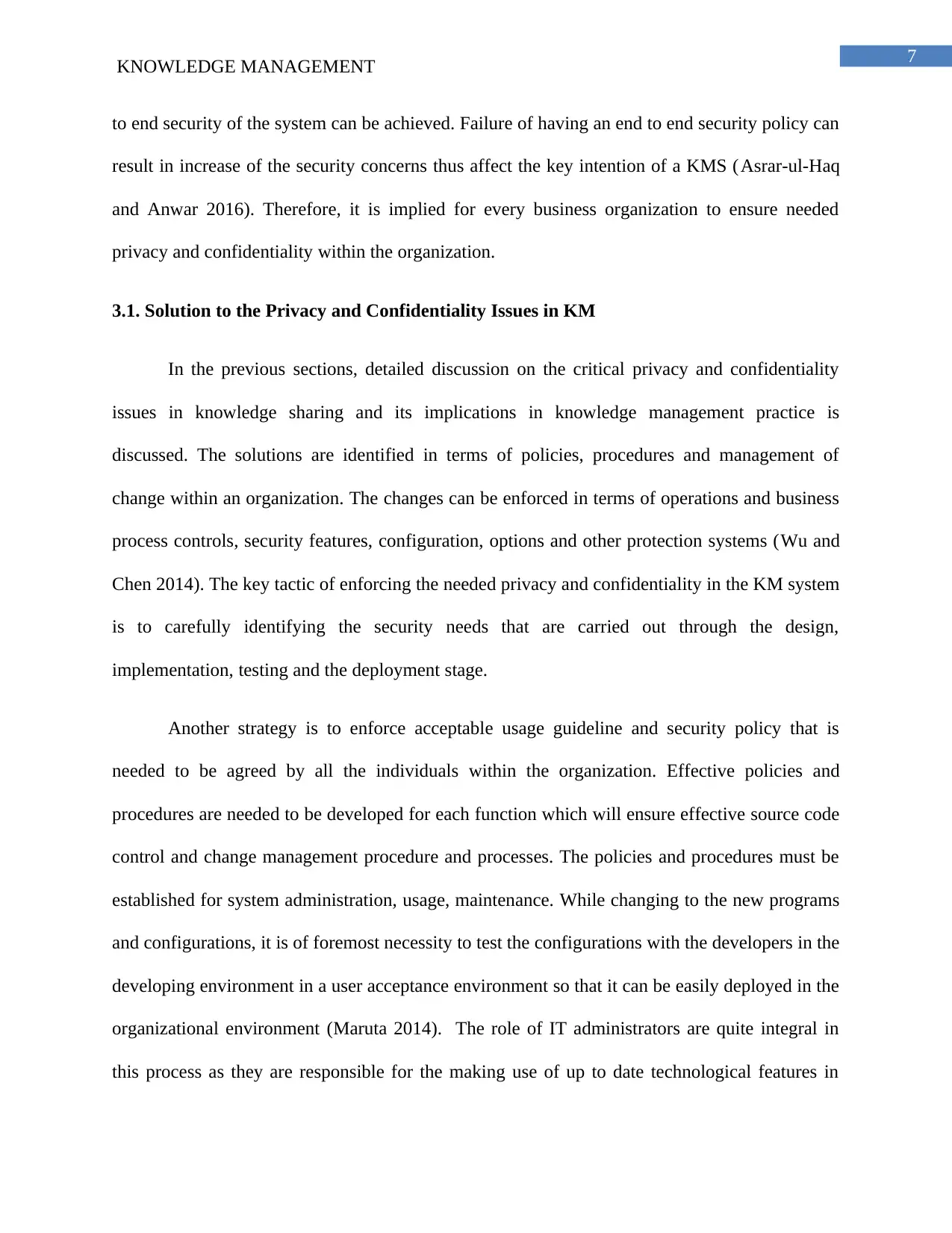
7
KNOWLEDGE MANAGEMENT
to end security of the system can be achieved. Failure of having an end to end security policy can
result in increase of the security concerns thus affect the key intention of a KMS (Asrar-ul-Haq
and Anwar 2016). Therefore, it is implied for every business organization to ensure needed
privacy and confidentiality within the organization.
3.1. Solution to the Privacy and Confidentiality Issues in KM
In the previous sections, detailed discussion on the critical privacy and confidentiality
issues in knowledge sharing and its implications in knowledge management practice is
discussed. The solutions are identified in terms of policies, procedures and management of
change within an organization. The changes can be enforced in terms of operations and business
process controls, security features, configuration, options and other protection systems (Wu and
Chen 2014). The key tactic of enforcing the needed privacy and confidentiality in the KM system
is to carefully identifying the security needs that are carried out through the design,
implementation, testing and the deployment stage.
Another strategy is to enforce acceptable usage guideline and security policy that is
needed to be agreed by all the individuals within the organization. Effective policies and
procedures are needed to be developed for each function which will ensure effective source code
control and change management procedure and processes. The policies and procedures must be
established for system administration, usage, maintenance. While changing to the new programs
and configurations, it is of foremost necessity to test the configurations with the developers in the
developing environment in a user acceptance environment so that it can be easily deployed in the
organizational environment (Maruta 2014). The role of IT administrators are quite integral in
this process as they are responsible for the making use of up to date technological features in
KNOWLEDGE MANAGEMENT
to end security of the system can be achieved. Failure of having an end to end security policy can
result in increase of the security concerns thus affect the key intention of a KMS (Asrar-ul-Haq
and Anwar 2016). Therefore, it is implied for every business organization to ensure needed
privacy and confidentiality within the organization.
3.1. Solution to the Privacy and Confidentiality Issues in KM
In the previous sections, detailed discussion on the critical privacy and confidentiality
issues in knowledge sharing and its implications in knowledge management practice is
discussed. The solutions are identified in terms of policies, procedures and management of
change within an organization. The changes can be enforced in terms of operations and business
process controls, security features, configuration, options and other protection systems (Wu and
Chen 2014). The key tactic of enforcing the needed privacy and confidentiality in the KM system
is to carefully identifying the security needs that are carried out through the design,
implementation, testing and the deployment stage.
Another strategy is to enforce acceptable usage guideline and security policy that is
needed to be agreed by all the individuals within the organization. Effective policies and
procedures are needed to be developed for each function which will ensure effective source code
control and change management procedure and processes. The policies and procedures must be
established for system administration, usage, maintenance. While changing to the new programs
and configurations, it is of foremost necessity to test the configurations with the developers in the
developing environment in a user acceptance environment so that it can be easily deployed in the
organizational environment (Maruta 2014). The role of IT administrators are quite integral in
this process as they are responsible for the making use of up to date technological features in
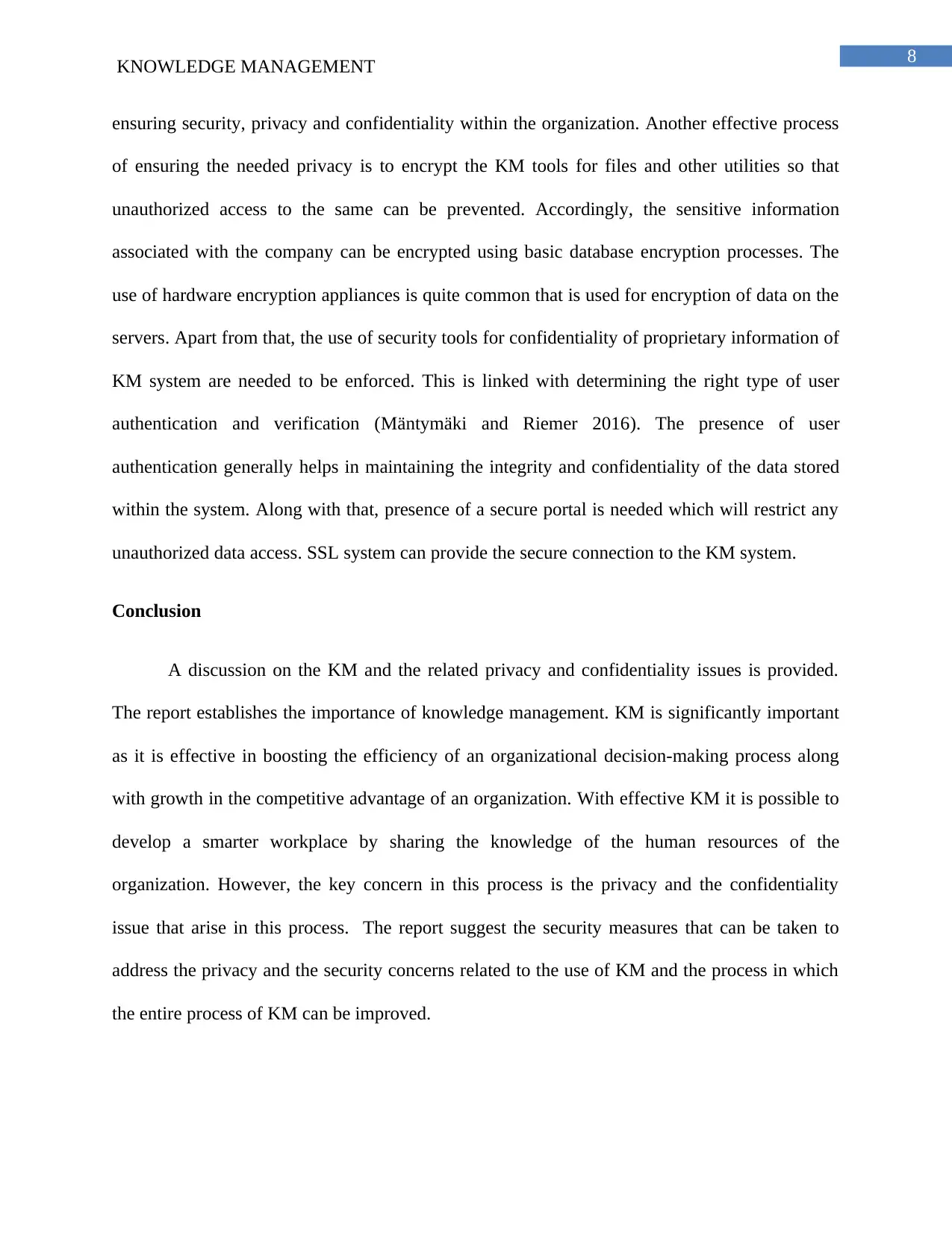
8
KNOWLEDGE MANAGEMENT
ensuring security, privacy and confidentiality within the organization. Another effective process
of ensuring the needed privacy is to encrypt the KM tools for files and other utilities so that
unauthorized access to the same can be prevented. Accordingly, the sensitive information
associated with the company can be encrypted using basic database encryption processes. The
use of hardware encryption appliances is quite common that is used for encryption of data on the
servers. Apart from that, the use of security tools for confidentiality of proprietary information of
KM system are needed to be enforced. This is linked with determining the right type of user
authentication and verification (Mäntymäki and Riemer 2016). The presence of user
authentication generally helps in maintaining the integrity and confidentiality of the data stored
within the system. Along with that, presence of a secure portal is needed which will restrict any
unauthorized data access. SSL system can provide the secure connection to the KM system.
Conclusion
A discussion on the KM and the related privacy and confidentiality issues is provided.
The report establishes the importance of knowledge management. KM is significantly important
as it is effective in boosting the efficiency of an organizational decision-making process along
with growth in the competitive advantage of an organization. With effective KM it is possible to
develop a smarter workplace by sharing the knowledge of the human resources of the
organization. However, the key concern in this process is the privacy and the confidentiality
issue that arise in this process. The report suggest the security measures that can be taken to
address the privacy and the security concerns related to the use of KM and the process in which
the entire process of KM can be improved.
KNOWLEDGE MANAGEMENT
ensuring security, privacy and confidentiality within the organization. Another effective process
of ensuring the needed privacy is to encrypt the KM tools for files and other utilities so that
unauthorized access to the same can be prevented. Accordingly, the sensitive information
associated with the company can be encrypted using basic database encryption processes. The
use of hardware encryption appliances is quite common that is used for encryption of data on the
servers. Apart from that, the use of security tools for confidentiality of proprietary information of
KM system are needed to be enforced. This is linked with determining the right type of user
authentication and verification (Mäntymäki and Riemer 2016). The presence of user
authentication generally helps in maintaining the integrity and confidentiality of the data stored
within the system. Along with that, presence of a secure portal is needed which will restrict any
unauthorized data access. SSL system can provide the secure connection to the KM system.
Conclusion
A discussion on the KM and the related privacy and confidentiality issues is provided.
The report establishes the importance of knowledge management. KM is significantly important
as it is effective in boosting the efficiency of an organizational decision-making process along
with growth in the competitive advantage of an organization. With effective KM it is possible to
develop a smarter workplace by sharing the knowledge of the human resources of the
organization. However, the key concern in this process is the privacy and the confidentiality
issue that arise in this process. The report suggest the security measures that can be taken to
address the privacy and the security concerns related to the use of KM and the process in which
the entire process of KM can be improved.
⊘ This is a preview!⊘
Do you want full access?
Subscribe today to unlock all pages.

Trusted by 1+ million students worldwide
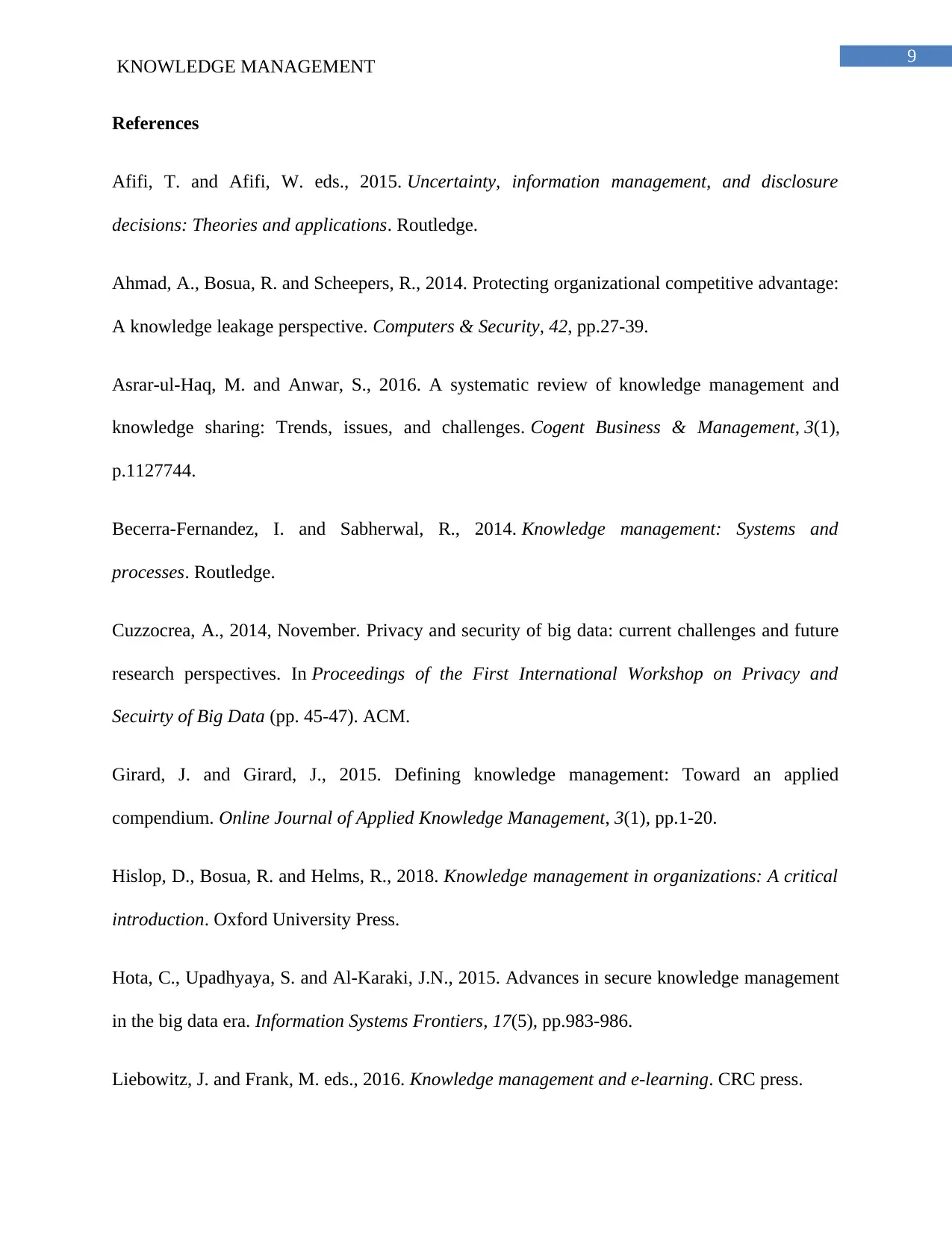
9
KNOWLEDGE MANAGEMENT
References
Afifi, T. and Afifi, W. eds., 2015. Uncertainty, information management, and disclosure
decisions: Theories and applications. Routledge.
Ahmad, A., Bosua, R. and Scheepers, R., 2014. Protecting organizational competitive advantage:
A knowledge leakage perspective. Computers & Security, 42, pp.27-39.
Asrar-ul-Haq, M. and Anwar, S., 2016. A systematic review of knowledge management and
knowledge sharing: Trends, issues, and challenges. Cogent Business & Management, 3(1),
p.1127744.
Becerra-Fernandez, I. and Sabherwal, R., 2014. Knowledge management: Systems and
processes. Routledge.
Cuzzocrea, A., 2014, November. Privacy and security of big data: current challenges and future
research perspectives. In Proceedings of the First International Workshop on Privacy and
Secuirty of Big Data (pp. 45-47). ACM.
Girard, J. and Girard, J., 2015. Defining knowledge management: Toward an applied
compendium. Online Journal of Applied Knowledge Management, 3(1), pp.1-20.
Hislop, D., Bosua, R. and Helms, R., 2018. Knowledge management in organizations: A critical
introduction. Oxford University Press.
Hota, C., Upadhyaya, S. and Al-Karaki, J.N., 2015. Advances in secure knowledge management
in the big data era. Information Systems Frontiers, 17(5), pp.983-986.
Liebowitz, J. and Frank, M. eds., 2016. Knowledge management and e-learning. CRC press.
KNOWLEDGE MANAGEMENT
References
Afifi, T. and Afifi, W. eds., 2015. Uncertainty, information management, and disclosure
decisions: Theories and applications. Routledge.
Ahmad, A., Bosua, R. and Scheepers, R., 2014. Protecting organizational competitive advantage:
A knowledge leakage perspective. Computers & Security, 42, pp.27-39.
Asrar-ul-Haq, M. and Anwar, S., 2016. A systematic review of knowledge management and
knowledge sharing: Trends, issues, and challenges. Cogent Business & Management, 3(1),
p.1127744.
Becerra-Fernandez, I. and Sabherwal, R., 2014. Knowledge management: Systems and
processes. Routledge.
Cuzzocrea, A., 2014, November. Privacy and security of big data: current challenges and future
research perspectives. In Proceedings of the First International Workshop on Privacy and
Secuirty of Big Data (pp. 45-47). ACM.
Girard, J. and Girard, J., 2015. Defining knowledge management: Toward an applied
compendium. Online Journal of Applied Knowledge Management, 3(1), pp.1-20.
Hislop, D., Bosua, R. and Helms, R., 2018. Knowledge management in organizations: A critical
introduction. Oxford University Press.
Hota, C., Upadhyaya, S. and Al-Karaki, J.N., 2015. Advances in secure knowledge management
in the big data era. Information Systems Frontiers, 17(5), pp.983-986.
Liebowitz, J. and Frank, M. eds., 2016. Knowledge management and e-learning. CRC press.
Paraphrase This Document
Need a fresh take? Get an instant paraphrase of this document with our AI Paraphraser
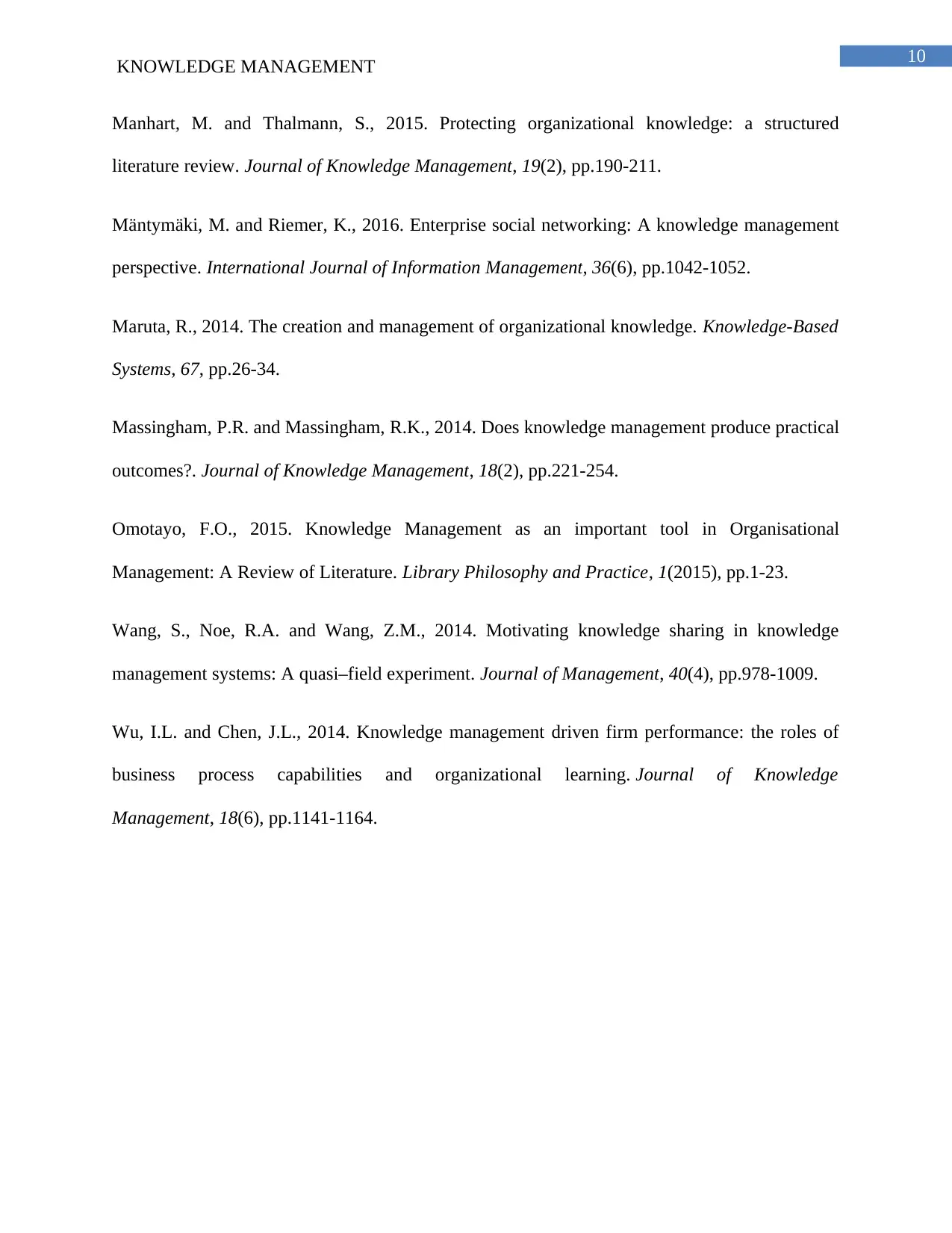
10
KNOWLEDGE MANAGEMENT
Manhart, M. and Thalmann, S., 2015. Protecting organizational knowledge: a structured
literature review. Journal of Knowledge Management, 19(2), pp.190-211.
Mäntymäki, M. and Riemer, K., 2016. Enterprise social networking: A knowledge management
perspective. International Journal of Information Management, 36(6), pp.1042-1052.
Maruta, R., 2014. The creation and management of organizational knowledge. Knowledge-Based
Systems, 67, pp.26-34.
Massingham, P.R. and Massingham, R.K., 2014. Does knowledge management produce practical
outcomes?. Journal of Knowledge Management, 18(2), pp.221-254.
Omotayo, F.O., 2015. Knowledge Management as an important tool in Organisational
Management: A Review of Literature. Library Philosophy and Practice, 1(2015), pp.1-23.
Wang, S., Noe, R.A. and Wang, Z.M., 2014. Motivating knowledge sharing in knowledge
management systems: A quasi–field experiment. Journal of Management, 40(4), pp.978-1009.
Wu, I.L. and Chen, J.L., 2014. Knowledge management driven firm performance: the roles of
business process capabilities and organizational learning. Journal of Knowledge
Management, 18(6), pp.1141-1164.
KNOWLEDGE MANAGEMENT
Manhart, M. and Thalmann, S., 2015. Protecting organizational knowledge: a structured
literature review. Journal of Knowledge Management, 19(2), pp.190-211.
Mäntymäki, M. and Riemer, K., 2016. Enterprise social networking: A knowledge management
perspective. International Journal of Information Management, 36(6), pp.1042-1052.
Maruta, R., 2014. The creation and management of organizational knowledge. Knowledge-Based
Systems, 67, pp.26-34.
Massingham, P.R. and Massingham, R.K., 2014. Does knowledge management produce practical
outcomes?. Journal of Knowledge Management, 18(2), pp.221-254.
Omotayo, F.O., 2015. Knowledge Management as an important tool in Organisational
Management: A Review of Literature. Library Philosophy and Practice, 1(2015), pp.1-23.
Wang, S., Noe, R.A. and Wang, Z.M., 2014. Motivating knowledge sharing in knowledge
management systems: A quasi–field experiment. Journal of Management, 40(4), pp.978-1009.
Wu, I.L. and Chen, J.L., 2014. Knowledge management driven firm performance: the roles of
business process capabilities and organizational learning. Journal of Knowledge
Management, 18(6), pp.1141-1164.
1 out of 11
Related Documents
Your All-in-One AI-Powered Toolkit for Academic Success.
+13062052269
info@desklib.com
Available 24*7 on WhatsApp / Email
![[object Object]](/_next/static/media/star-bottom.7253800d.svg)
Unlock your academic potential
Copyright © 2020–2026 A2Z Services. All Rights Reserved. Developed and managed by ZUCOL.





